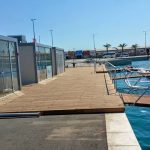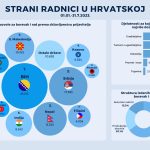The airline was forced to cease operations last summer.
European Coastal Airlines (ECA), which had to suspend all flights of its seaplanes last summer by order of the Croatian Civil Aviation Agency (CCAA), is currently in the pre-bankruptcy settlement process. Due to the disruption of the implementation of the project, it has prepared a comprehensive material for a lawsuit against the competent Croatian regulatory agency, reports Poslovni.hr on September 2, 2017.
“We have consulted with legal experts from the aviation sector, and we have gathered Croatian and German lawyers and filed a lawsuit for our total investment of 22.5 million euros,” said Klaus-Dieter Martin, the company’s director. “It turned out that the CCAA findings were not justified in any way, and this is not just my opinion but the view of ten aviation experts from Croatia and Europe, including court-appointed experts. Several experts in Croatia have issued their opinion under oath that the CCAA inspection was wrong, too excessive and arbitrary. The proof that our aircraft were operational is that we started flying again three weeks after the CCAA wrongly took our license for maintenance. The licenses and permits were issued because we had met all the requirements, but the financial loss due to the grounding of the entire fleet in the middle of the flying season had already reached millions of euros,” explains Martin why the continuation of the company’s operations was no longer possible.
All licenses have been returned to the Agency. He believes that the date of the inspection and the closure of the ECA activities was deliberately timed during the high season, to cause the company the most damages. After the grounding of the fleet, German shareholders gave ECA 1.3 million euros to pay the salaries of Croatian workers and then stopped all the flights. “They are no longer willing to invest in Croatia or to cover the losses for which the CCAA is responsible. After being grounded, I was waiting patiently for the experts’ opinion, and only then did I sent a complaint to Transport Minister Oleg Butković about the competence of the authorities. However, the Ministry forwarded my letter to the CCAA, after which the agency director filed a criminal complaint for defamation against me… Unfortunately, the CCAA does not respect the opinion of court-appointed experts and undermines the Croatian legal system. My staff was threatened, a court-appointed expert received an anonymous threat, and some media were paid to publish articles against the company and me,” says Martin.
He says that the ECA “performed only day-to-day maintenance and servicing of the aircraft, which was done by Canadian engineers with more than 30 years of experience on seaplanes. The primary maintenance was performed by RUAG, a Swiss company with more than 7,000 employees. RUAG confirmed that they did not see a reason for the grounding of planes because the planes are in a good overall shape.”
Asked whether he had the support of the government for the project in which he had been intensively involved for years, Martin openly says that, “if Prime Minister Zoran Milanović did not support the project, ECA would not get a concession in the port of Split, because of the then director of the Port of Split Milan Blaževski and Split Mayor Ivo Baldasar. The Mayor told our investment team that we have to pay for the entire redesign of the Split waterfront, which was about between 50,000 and 100,000 euros, which we refused to do. And Blaževski asked for an additional payment for seaplanes to moor next to our own pontoons in the port, in the concession area for which the fee was already being paid. ECA never received any support from the new government. After the grounding of our planes, I asked in vain for a meeting with the Transport Minister and the Prime Minister. They did not want to meet with me, even though we had invested 22.5 million euros and employed over 150 people. And, in some cases, lower administration levels indirectly hindered the project, and the reasons are well-known,” says Marin about his entrepreneurial problems.
The media in recent days published an article about an anonymous aviation expert claiming that the ECA project had too little money and that the price of passenger tickets was not economically justified.
“The profitability had not been achieved in the expected time frame since we often had to wait for years to obtain concessions for seaplane pontoons for the arrivals and departure of passengers. Last year, ECA had 11 seaplane docks in Croatian ports. The company would become profitable within the next two years. We had very solid, mostly German investors who believed in the project and financed it with their equity, without a single cent of a bank loan. The financial management of the project was led by a financial advisory firm that was named the best in Germany for two consecutive years We transported up to 600 passengers per day on 60 flights, with an average ticket price of 80 to 90 euros, so it is not difficult to calculate income during the summer,” says Martin.
Asked about speculation that ECA wants to buy Airways from Montenegro, Martin replies, “As far as we know, under that name, there is an Arabian-Australian investment company from Montenegro which wanted to take over ECA, but that was more a false attempt to get concessions. If Croatia thinks that in the future Arab investors would better investment partners than German investors, then I wish them good luck. As far as I know, this company had a license in Montenegro that has been withdrawn several times. They have one Cessna 172 and one helicopter.”
The Croatian Civil Aviation Agency (CCAA) reacted to Martin’s comments. “We believe this to be one in a series of attempts to mislead the public by Mr Martin, who uses the media to pressure the Agency and the courts which are conducting the legal proceedings. In this way, he is trying to shift the responsibility for the ECA’s business results and losses to the Agency. We emphasize that, in the case of ECA, we acted within our legal jurisdiction and have taken all measures based on the laws and EU regulations in order to protect the security of air transportation, which is the primary task of the Agency,” said Eduard Šoštarić, a spokesperson for the CCAA, in a statement
Translated from Poslovni.hr.








